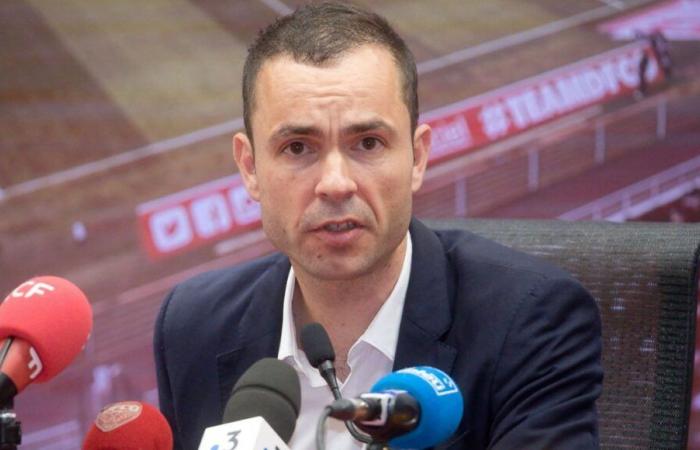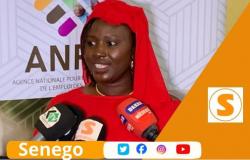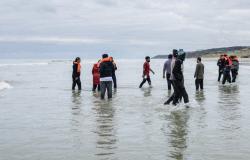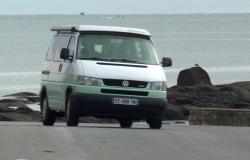Changes to come in the workforce of the DFCO, currently 7th in the National. “I hope not to have to part with some of the staff, but if, at some point, it can help preserve 90% of jobs, it is my responsibility to do so”, declared the new president Pierre-Henri Deballon on the France Bleu Bourgogne microphoneat the time of the buyout last July. As relayed since by our colleagues from Public Good end of September, then by Les Echos this week, the situation is becoming clearer. Layoffs should occur soon, confirms Pierre-Henri Deballon, contacted by France Bleu Bourgogne this Wednesday.
Ten departures among administrative staff
In total, between the professional section and the association, the DFCO has 160 employees, including administrative staff, who work in the offices, and the sports sector (players and managers). Pierre-Henri Deballon indicates to the Echos that he moves towards “economic layoffs, with 50% of administrative staff, or around ten people immediately”. According to our information, the founder of Weezevent is due to meet employees this Thursday at the Saint-Apollinaire training center to announce the decision.
“It’s not easy, it’s very hard, but there are no other solutions”he regrets to France Bleu Bourgogne this Wednesday. “It's a matter of life and death, specifies Pierre-Henri Deballon. It's not a lack of ambition, we are forced to make strong choices. Otherwise, in three years, you will see me walking behind the club's coffin.” .
Why such a restructuring?
With a annual deficit of seven million euros in National, and an operation inherited from the recent past in the professional world, the situation was no longer tenable according to the new president. In the third division, semi-amateur landscape, no TV rights, unlike Ligue 1, and, to a lesser extent, Ligue 2. The Stade Gaston-Gérard is less equipped – a affluence around 5,000 spectators this season in National – with 1,500 subscribers – compared to around 12,000 on average before the Covid-19 crisis in Ligue 1.
Recent transfers – Cyriaque Irié to Troyes for three million euros, Rayane Messi to Strasbourg for one million – do not compensate for the losses. The rental of infrastructure – training center, Stade Gaston-Gérard – represents a significant part of the budget, several hundred thousand euros per year. Agreements, legacies of years in the elite, weigh down the accounts, like this contract which runs until 2028 for the bus marked “DFCO”: 40,000 euros per year, without driving, a bill to which we must obviously add the gasoline, maintenance and tolls.
The new owner wants to come back “to a form of reality”. Among other avenues to reduce the size, he plans to review the contracts with certain suppliers, but also the “rhythm of life” of the club. Jumbled together, he discusses with France Bleu Bourgogne the cost of train travel for travel, the reservation of away hotels on the eve of matches, pre-season training courses, and the size of the staff to supervise the teams.
What future for the women's section?
What about the women's section, which has been playing in the elite for seven seasons, and which has had an excellent start to the year, with a fourth place in the Premier League? And which has just inaugurated its training centerrecognized by the FFF, last July? According to Pierre-Henri Deballon in the columns of Les Echos, “its operating budget is in deficit of just over 500,000 euros. It must be brought back into balance before the end of the season”. The new owner also opens the door to find a buyer for the women's DFCO.
It aims for a drastic reduction in the payroll of the women's section, otherwise the future will become very dark. “This is the most likely scenario, because I do not want the women's team to stop completely, but it is not excluded,” declares Pierre-Henri Deballon, still in Les Echos.
“I have the role of the bad guy who doesn’t want women’s football, but no!”he defends himself on France Bleu Bourgogne. He highlights an untenable economic model, with only 50 subscribers, a few hundred people in Gaston-Gérard to watch the matches, and the difficulty in finding patrons, whether they are private or public partners (region and department).
What about the men’s training center?
In January 2014, the DFCO inaugurated its training center. Installed first in Poussots, then in Saint-Apollinaire. Nearly eleven years later, the men's team's nursery is also threatened by restructuring. Still in Les Echos, Pierre-Henri Deballon announces that he wants “continue training” but without “keep the FFF and League approval, which is far too restrictive for French football in general, with its medical staff, its facilities, etc. We are going to return to a more associative operation. The decision is imminent”.
“It’s not settled”specifies Pierre-Henri Deballon to France Bleu Bourgogne this Wednesday, explaining that the specifications imposed by the football authorities “costs a fortune”. “We don’t stop training, but we return to a form of reality”he specifies. He takes the example of midfielder Jordan Marié, today captain of the team, trained at DFCO… before the training center was certified.
To reduce its costs and expenses, the DFCO has already sold the Saint-Apollinaire training center complex, where the youth and women's teams train and live since 2022. It was acquired by the Dijon Metropolis, decision formalized on September 26, 2024, for the sum of 11.9 million euros. An amount which was used to repay DFCO’s bank debt. Of these nearly 12 million, 5.4 million actually came to fill the club's coffers. “And if we don’t do anything, by July, it’s gone”calculates Pierre-Henri Deballon on France Bleu Bourgogne.






